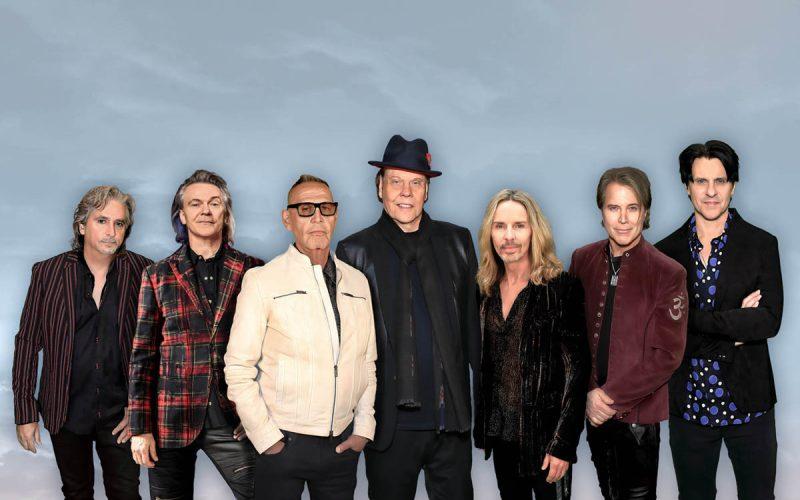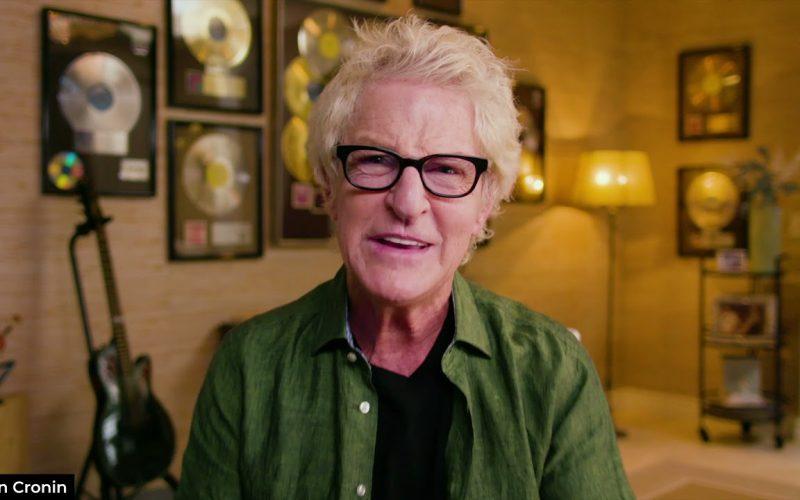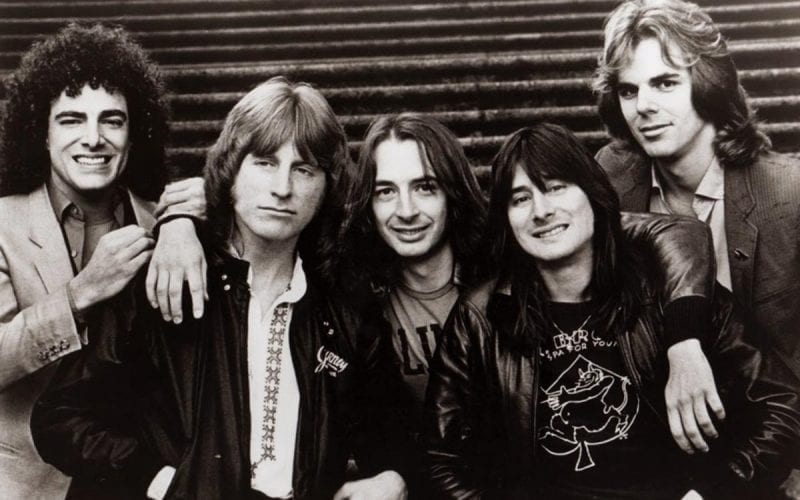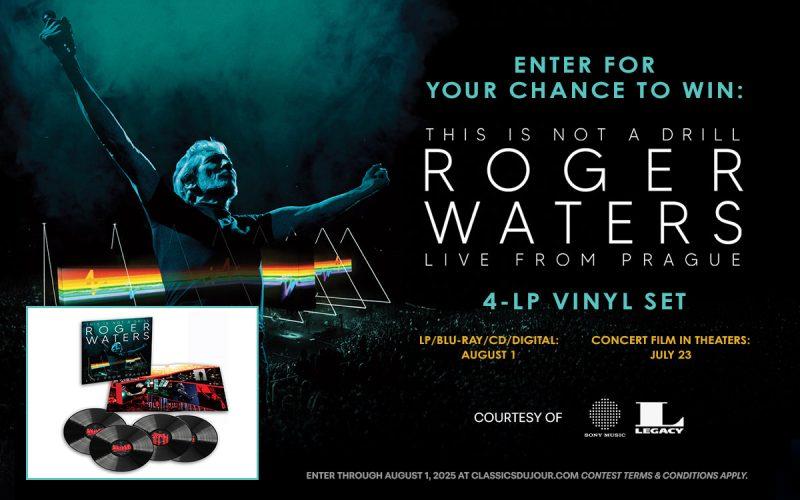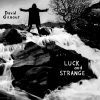
“I look at Spotify. It’s not a great moneymaker, on the one hand. On the other hand, maybe it does help because you’re spreading the word wider. If there’s over a million people listening to a Styx song every day, that’s pretty great because that means they’re continuing to be the faithful fans, and we’re willing to come to their town. They get to enjoy us in the most enjoyable manner, which is to come and see a live rock show.”
Styx has toured and traveled across the globe for well over four decades. Today, the band – James “JY” Young. Tommy Shaw, Lawrence Gowan, Chuck Panozzo, Ricky Phillips and Todd Sucherman – is on a new mission. The group has just launched an expansive North American tour along with fellow frequent flyers Joan Jett and The Blackhearts and Tesla. The trek is in support of the band’s latest sonic sojourn, a concept album titled The Mission.
In keeping with the powers of invulnerability provided by the mythical river from which the band’s name is derived, Styx has just announced two new album releases on their docket for June and July. The Mission reissue in 5.1 surround sound and including exclusive video content will arrive on July 27. Also, Tommy Shaw and The Contemporary Youth Orchestra’s Sing For The Day! Will be available on Blu-ray, CD and digital formats on June 29. I recently had a conversation with vocalist and keyboardist Lawrence Gowan about the tour, The Mission and the conundrum of convincing classic rock radio to play current songs.
Q&A by Jim Villanueva
Hello, Lawrence, it’s good to talk to you again. I went back through my archives before we jumped on the phone today, and last time we spoke was in 2014. So, it’s been a minute.
LG: Oh, it seems like a minute, but it’s been four years.
Yes, it does. Thanks for your time today, and let’s have some fun with this conversation, shall we!
LG: Sure!
Let me kick it off with this: pun intended, who first launched the idea of taking a sonic mission to Mars?
LG: Well, I have to give credit to NASA, first and foremost, and then after them my guess would be Styx (laughs). I think it really came about with Tommy writing this piece, this whimsical piece of music called “Mission To Mars.” We’re NASA fans. Anything to do with space – like most people on planet Earth – we’re very curious about it. And it’s just a great subject. There seems to be far more agreement on that than anything else (laughs). And let’s face it, it’s the greatest endeavor during our lifetime that we’re getting to witness. So, when he had this kind of whimsical piece – which wound up being the last song on the album – he played it for me on the bus, from his phone, and I was just captivated by it right away and thought it was great. So, a few weeks went by and he played me a song called “Locomotive.” He put the two songs back-to-back, and he said, ‘What do you think if we do a concept record built around this?’ I love concept records. The notion of doing something with broad strokes rather than looking for the next hit single – which really, it’s just not the climate for that anyway, for a classic rock band – I just thought let’s do something that resonates well with the past. So, basically that’s how it emerged.
I mentioned at the top that we should have some fun with the conversation. I thought I’d follow your band’s lead and conduct what I would call a “concept conversation.” I’m gonna base some of my questions on the album’s song titles, so here we go. So, I doubt you guys have logged a “Hundred Million Miles” on the road…
LG: I’m sure we have (laughs)! I mean, check the record on that (laughs).
You might have. If not, you’re getting close (laughs). I know you love performing, but do you still enjoy being on the road?
LG: There’s really nothing about this lifestyle that I’ve been living for the past 42 years of being a musician that I’m not entirely enamored with. I know it leads to a lot of solitary hours. I’m okay with those because I’m a songwriter and those hours are well-filled. Waking up in a new city everyday for about a hundred days a year I find invigorating, because I never know quite where I am, and yet I can find my way to the coffee shops of America pretty well anywhere I’m dropped off (laughs). The only thing that’s become a little prohibitive is having to go to the airport. But we don’t do a lot of that because we spend most of our time on a tour bus. And it makes the time at home all the more valued, when we do have a few days off here and there. And, I like to keep moving.
Speaking of touring, you guys just kicked off the summer tour with Joan Jett and The Blackhearts and Tesla. How much of The Mission – the new album, of course – can fans expect to hear at these shows?
LG: They’re gonna hear a few surprises at these shows. We’re actually squeezing in four pieces from The Mission, plus the intro music which we walk onstage to is “Overture.” So, there’s quite a bit of it kinds weaved, woved (laughs), woven (laughs) kinda seamlessly in a lot of ways that finds its way in-between the classic Styx songs that people know and love and come to hear. We’re really knocked out with just how well the songs from The Mission have been going over over the past year. I think it’s because sonically they’re not a jarring departure from the classic rock sound of the late 70s. So, yeah, we’re actually squeezing them in. Two of them are very short. “Gone Gone Gone” and then I do “Khedive,” just as a little piano solo leading up to “Come Sail Away.” So, they’re cleverly interspersed with the classics.
So, staying on the road and onstage, more specifically. More specifically (laughs)? We’re having trouble with English today (laughs).
LG: (Laughs) Your specification is fine (laughs)!
What is the most “Trouble” you’ve found yourself in at a “Big Show?” [NOTE: “Trouble At The Big Show” is another song title off The Mission]. Allow me to explain. Have you ever fallen off a stage, lost your voice, experienced equipment failure or a wardrobe malfunction?
LG: Yes! All of the above. Numerous times. And, in almost every case, it leads to a better show. I don’t know why. We did like a residency in Las Vegas earlier this year with [former Eagles guitarist] Don Felder, and the last two nights I got “Vegas throat,” which means you lose your voice entirely (laughs)! And I can tell you it’s the most terrifying thing in the world. Well, maybe not in the world. But for a singer, it’s really terrifying to walk onstage with no voice. And yet, the shows went over really, really well. Tommy came over and kinda helped out in sections of “Come Sail Away.” I got the audience to sing along in other parts. Um, I don’t know what that says about my singing, so, there’s that. The next one is, as you may be aware – I’m sure you are – I perform on a spinning keyboard and there have been incidents of embarrassing mayhem that have ensued from that. Again, all of which wound up with the audience loving it. The worst one was about 25 years ago when I forgot to put the brake on when I do the big jump on top of it and use it as a springboard to jump off. I forgot to put the break on and the thing spun around and I came down and my tailbone hit the backend of the keyboard as it spun with me. I’d have to draw a cartoon of this to really make it…
I get the visual (laughs)
LG: Yeah, so my tailbone hit the end of the stand. Of course the whole thing is on a pedestal, so the whole thing went toppling toward the audience. The keyboard came out of the tray and crashed off the end of the stage and into the front row. People just jumped back and keys flew everywhere. The bruise on my tailbone was about the size of a hockey puck for about six weeks, but the best part of it was that there was about a five-thousand dollar keyboard in pieces on the floor. What do you think the reaction was from the crowd? It was unanimous, like, ‘YEAH!’ (laughs).
(Laughs) ROAR!(laughs). What about wardrobe malfunctions?
LG: Wardrobe malfunctions. Often. Yes. In my solo shows I wear a kilt onstage, so I’ll leave that to the imagination as to how the wardrobe can malfunction in all kinds of ways in that show.
Thank you very much.
LG: You’re welcome (laughs). Again, leave it to the imagination. I’m not gonna get too graphic. And what was the other one? Equipment failure! Ah, yes. The most classic one of all time was last year, in California, by the way, in Carmel. A Styx show. And the entire city went into a blackout and we were about five, maybe six, songs into the show. I think it was in the middle of “Fooling Yourself” when the power went out. Tommy got an acoustic guitar. Todd just picked up a tambourine. We finished the song. And then we just yelled at the audience – it was a small theatre – and said, ‘Do you want us to keep going?’ Down by the dressing rooms we found a Spinet piano, which was kinda out of tune, and we had the crew bring it up. So, we just did an acoustic show in the dark (laughs). We played for about another half hour, and the audience stayed. The greatest equipment malfunction ever, and probably the most memorable show of 2017.
That’s great. And I can think of a lot worse places to be in the dark than Carmel, California.
LG: Yes! It wasn’t that bad, at all.
A beautiful town. I wanna ask you about “Radio Silence,” but not the song on the album, but the fact that classic rock stations don’t play current music from classic artists. Is this something that’s taken into consideration when discussions arise on whether or not to record a full album?
LG: Yes, it is. And first of all, let me say you’re the first person I’ve spoken to regarding the record that does see the double entendre, the kind of subtle reality that [the song] “Radio Silence” means. Even as we were working on the song, I kept looking at the lyrics and seeing that this has got a double meaning. It’s part of the linear story in the record. It’s easy to follow that narrative, but really it does speak to the radio silence that exists when it comes to the dilemma of how do you support classic rock bands making new music today. I can understand it actually from the radio perspective when they go, well in order for it to be classic it’s gotta be about 25 years old. So, I look forward to The Mission has just 24 more years to go (laughs) before it qualifies (laughs)! It’ll be in the adds. Now, here’s the ironic paradox. The classic rock stations – almost everyone of them – really embraced the record, but on their websites (laughs). So, they really helped to promote the record on their websites. They would play the videos on their website. We’ve done one for every song on the record with various footage that we’ve picked up from NASA, etcetera, and NASA themselves did a video for “Gone Gone Gone.” But, yes, it’s the current state of affairs. So, yes, it is daunting for a classic rock band to take the time – for us to take six months to a year – off the road, when the music business is entirely focused on playing live right now. At least for us. That’s a hard decision to make. But as the album began to emerge it just felt like this was a worthy endeavor, and lets just keep doing it anyway. All very worthwhile.
Mission accomplished, I guess. Right?
LG: There you go.
So, there are seemingly “Ten Thousand Ways” [another song title off The Mission] to listen to music these days. Spotify, etcetera, etcetera, etcetera. When it comes to finances. The dollars and cents. Are these services the sonic equivalent of pickpockets? How do you guys view these services?
LG: Well, how do we view them? We all have our own take on that. We don’t have a band mindset on it because we all make various observations about it. I look at, for example Spotify, it’s not a great moneymaker, on the one hand. On the other hand maybe, it does help because you’re spreading the word wider. The thing is, if you think about, if there’s over a million people listening to a Styx song every day, that’s pretty great because that means they’re continuing to be the faithful fans, and we’re willing to come to their town. They get to enjoy us in the most enjoyable manner, which is to come and see a live rock show. So, I see it as basically as just a way to keep spreading the gospel wider. I think that what will happen is that there’s gonna be someway of artists being directly enumerated for their work in the future. If that gets resolved, then we might wind up having a system that’s even fairer or more fair than its ever been. Good things are on the horizon, I think.
Two more questions for you, Lawrence. So, I am a junkie for the [AXS TV series] The Big Interview with Dan Rather. It’s one of a small handful of shows that I record. I found your recent episode [along with Tommy and “JY”) to be one of the best yet. I applaud you guys for being so earnest and honest regarding the Styx story. As someone whose had hundreds of these conversations, I can only dream of having conversations as frank and as fun as yours on the show. So, from an interviewee’s perspective, what’s the key tool that every interviewer needs to possess?
LG: Curiosity is really what’s necessary. You can tell within 30 seconds how much you’re going to engage in an interview because you can easily read the level of authentic enthusiasm that the interviewer has. If you’re speaking to someone who’s just a flat out gushing fan, you’re going to temper your answers in that direction. If you’re speaking to someone who’s basically just done a quick Google search (laughs), a brief Wikipedia read, you’re gonna get silly questions and you’ll try to – in my case, because I’m Canadian (laughs) – you’ll try to politely answer as best you can, and with some thinly-veiled sarcasm that they’ll probably won’t discover until well after the conversation has come to an end (laughs). But, like in the first two minutes of me talking to you – you telling me about our history and stuff like that – I can tell why I don’t feel any desire necessarily to get off the phone quicker (laughs)! I think the better interviews come from the people who have a genuine curiosity.
Final question, and I think I know the answer, but give it to be anyway. Would you go on a mission to Mars?
LG: Oh, man. I cannot answer that, even to myself. Part of me really hopes I would say yes. You know what, if there was a gig there, I’d do it (laughs)! That I know. Because I’ve gone to places that I would never go. So, if past behavior is any predictor of future behavior, it would depend upon that. And if there was an actual Martian audience, I would love to engage them.
Well, Bowie had the song “Life On Mars,” so, I guess you’re looking at Live On Mars!
LG: Yeah! Live on Mars! (Singing) Are we live on Mars (laughs)!
I’m sure the show would be out of this world (laughs). Let’s end it there. It was great to talk you, again.
LG: Alright, Jim. Fun chat. Cheers. Bye

